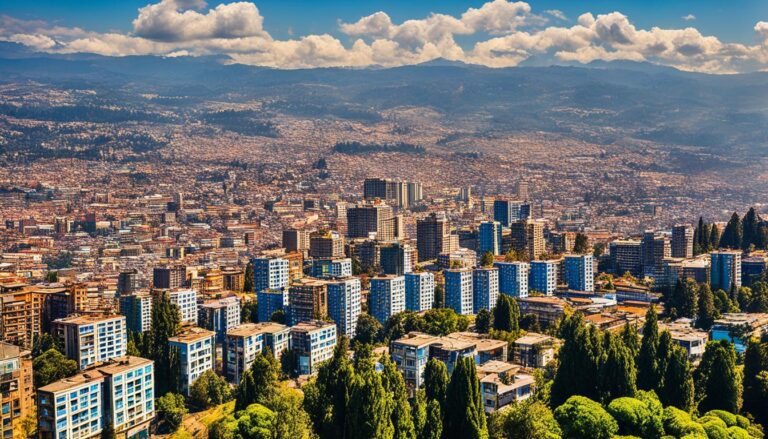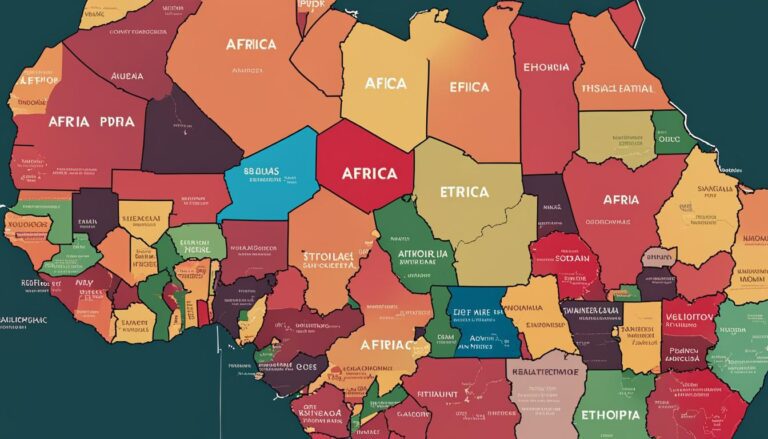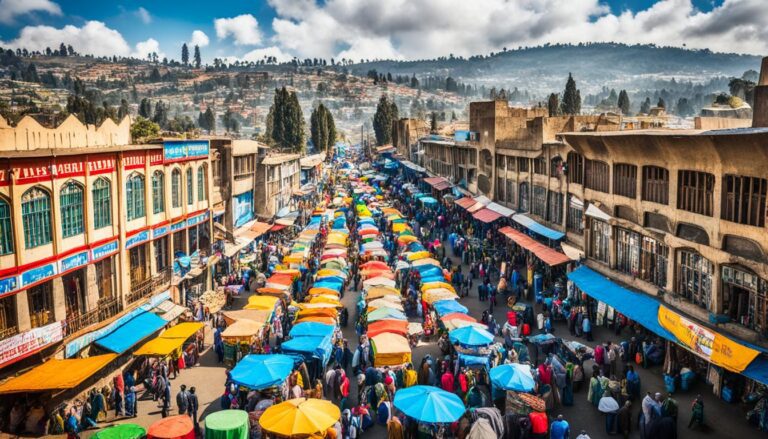Is Ethiopia Good to Live?
Did you know that Ethiopia is known as the “Land of Origins” because it is believed to be the birthplace of humanity? This African country offers a unique blend of history, culture, and natural beauty that attracts individuals from around the world. If you’re considering a move to Ethiopia, it’s important to understand the lifestyle, benefits, and quality of life in this diverse nation. Let’s dive into the pros and cons of living in Ethiopia, so you can make an informed decision about whether it’s the right place for you.
Key Takeaways:
- Ethiopia offers a vibrant lifestyle, delicious cuisine, and unique clothing styles.
- The absence of snow and the presence of 13 months in a year are factors that make Ethiopia stand out.
- Challenges like healthcare concerns and infrastructure limitations should be considered when deciding to live in Ethiopia.
- Living in Ethiopia provides opportunities to immerse yourself in Africa’s diverse wildlife and rich natural habitats.
- Traditional Ethiopian food is known for its delicious flavors and unique dishes.
Pros of Living in Ethiopia
When it comes to the lifestyle in Ethiopia, there are numerous benefits that make it an attractive place to live. From the vibrant cultural traditions to the delicious cuisine, Ethiopia offers a unique and enriching experience. Let’s explore some of the reasons why living in Ethiopia can be so rewarding.
Vibrant Lifestyle
Ethiopia’s lifestyle is characterized by a vibrant and diverse culture. The country is home to numerous ethnic groups, each with its own distinct traditions and customs. From colorful festivals to lively music and dance, there’s always something happening in Ethiopia. The local communities are welcoming and warm, creating a sense of belonging for residents.
Delicious Ethiopian Cuisine
Food lovers will revel in the delicious flavors of Ethiopian cuisine. With its rich spices and unique dishes, Ethiopian food is a true gastronomic delight. From injera, a traditional sourdough flatbread, to doro wot, a spicy chicken stew, the flavors of Ethiopia will tantalize your taste buds.
Unique Clothing Styles
Ethiopian fashion is known for its unique and vibrant clothing styles. From the traditional white cotton dress, called the habesha kemis, to the intricately woven shawls, Ethiopian clothing reflects the country’s rich cultural heritage. Embracing the local fashion can be a way to connect with the community and express your personal style.
Absence of Snow
If you’re tired of shoveling snow and enduring freezing winters, Ethiopia offers a welcome change. With its sub-Saharan desert climate, the country experiences mild temperatures year-round and an absence of snow. You can trade in your winter boots for sandals and enjoy the warmth of the sun throughout the year.
13 Months in a Year
Ethiopia follows a unique calendar that consists of 13 months, with each month having 30 days and the last month having 5 or 6 days. This additional month, known as the “Pagume” month, provides an extra opportunity to celebrate and enjoy special events. The presence of 13 months in a year is a fascinating cultural aspect that sets Ethiopia apart.
Cultural Differences
Ethiopia’s cultural differences are a source of intrigue and fascination. Ethiopians follow their own clock, known as Ethiopian Time, which is seven years behind the Western Gregorian calendar. This cultural distinction contributes to a refreshing perspective on time, fashion, and societal norms. Living in Ethiopia allows you to embrace this cultural diversity and see the world through a different lens.
Opportunity to Experience Traditional Round Thatched Roof Huts
Immerse yourself in Ethiopia’s rich architectural heritage by experiencing traditional round thatched roof huts. These unique dwellings provide a glimpse into a traditional way of life, showcasing the use of local materials and sustainable building practices. It’s an opportunity to connect with nature and learn valuable skills related to self-sufficiency.
Historical Significance
Ethiopia holds great historical significance as Africa’s first independent state. The country has a rich heritage, with ancient ruins, rock-cut churches, and historical landmarks that date back thousands of years. Exploring Ethiopia’s historical sites allows you to delve into the past and appreciate the country’s enduring legacy.
These are just a few of the reasons why living in Ethiopia can offer a rewarding and unique experience. From the vibrant lifestyle and delicious cuisine to the historical significance and cultural diversity, Ethiopia has much to offer for those seeking a truly enriching lifestyle.
Cons of Living in Ethiopia
While Ethiopia has its merits, there are also challenges to living in the country. Some of the drawbacks include:
- The prevalence of malaria as a leading cause of death, posing health risks to the population.
- Frequent humanitarian crises that can disrupt daily life and access to basic necessities.
- The classification of Ethiopia as a third-world country, which may impact infrastructure development and living conditions.
- The absence of national elections since 1993, raising concerns about democratic governance and political stability.
- Cultural differences such as communal eating practices and dress codes, which may require adjustment for newcomers.
- The country’s status as one of the poorest in Africa, affecting the overall standard of living.
- The lower standard of living compared to the United States, especially in terms of income, healthcare, and education.
- Concerns about drinking water quality and access to clean and safe water sources.
These factors may impact the overall quality of life for individuals considering a move to Ethiopia. However, it’s important to note that experiences can vary depending on personal circumstances, adaptability, and access to resources.
Comparative Quality of Life: Ethiopia vs. United States
| Factors | Ethiopia | United States |
|---|---|---|
| Income | $2,500 (average annual salary) | $56,000 (median household income) |
| Healthcare | Limited access to quality healthcare facilities and services. | Well-developed healthcare system with advanced medical treatments and services. |
| Education | Challenges in accessing quality education, especially in rural areas. | Highly developed education system with a wide range of educational opportunities. |
| Infrastructure | Basic infrastructure, including roads and utilities, may not meet the standards of more developed countries. | Advanced infrastructure with well-maintained roads, utilities, and public services. |
| Cost of Living | Relatively low cost of living, making essential goods and services more affordable. | Higher cost of living, particularly in major cities, with increased expenses for housing, healthcare, and education. |
When considering a move to Ethiopia, it’s essential to weigh the pros and cons carefully, taking into account personal preferences, lifestyle requirements, and expectations. Conducting thorough research and consulting with professionals can help individuals make informed decisions about their quality of life in Ethiopia.
Africa’s Diversity and Wildlife

One of the advantages of living in Ethiopia is the opportunity to experience the rich diversity of Africa’s wildlife. Ethiopia is home to a wide range of species, including lions, giraffes, elephants, and antelope. Living in close proximity to these animals allows us to immerse ourselves in the unique beauty of African wildlife and natural habitats.
Imagine waking up to the sound of lions roaring in the distance or witnessing a herd of elephants gracefully moving through the vast African savannah. In Ethiopia, these incredible encounters are not just reserved for safari tourists but are part of everyday life for residents.
The Magnificent Wildlife of Ethiopia
Ethiopia boasts a diverse range of habitats, from the lush rainforests of the southwest to the arid deserts of the northeast, providing a home to a fantastic array of wildlife species. Here are some of the incredible creatures you can encounter while living in Ethiopia:
| Animal | Image | Description |
|---|---|---|
| Lions | Ethiopia is home to a significant population of lions, with the majestic creatures found in several national parks and wildlife reserves. Observing lions in their natural habitat is an awe-inspiring experience that residents can enjoy. | |
| Giraffes | Witnessing the graceful movements of giraffes as they tower above the acacia trees is a common occurrence in Ethiopia. These elegant creatures can be seen in various national parks across the country. | |
| Elephants | 
|
Ethiopia is a haven for elephants, and living in the country provides countless opportunities to witness these gentle giants up close. From the lush forests of the Bale Mountains to the vast landscapes of the Omo Valley, elephants can be found in various regions. |
| Antelope | Ethiopia is home to numerous antelope species, including the majestic Swayne’s hartebeest, the endemic Nyala, and the charismatic Dibatag. These graceful creatures can be spotted in the country’s national parks and protected areas. |
Living amidst Ethiopia’s magnificent wildlife offers unparalleled opportunities for nature enthusiasts and animal lovers. Whether it’s witnessing extraordinary lion hunts, observing giraffes gracefully grazing on treetops, or marveling at the intelligence and social dynamics of elephant herds, the wildlife of Ethiopia never fails to captivate.
Exploring the diverse ecosystems and encountering these incredible animals on a regular basis truly enhances the quality of life for those living in Ethiopia, creating a unique and unforgettable experience.
Delicious Ethiopian Cuisine

When it comes to food, Ethiopia is a culinary paradise. Ethiopian cuisine is renowned for its delicious flavors, unique spices, and vibrant dishes that reflect the country’s rich cultural heritage. One iconic dish that showcases the incredible flavors of Ethiopian food is Doro Wot, a slow-cooked stew made with chicken or beef.
Doro Wot is a testament to the culinary expertise of Ethiopia, with its combination of aromatic spices like berbere, a traditional Ethiopian spice blend, and the savory taste of tender meat. This hearty stew is typically served with injera, a spongy bread made from fermented teff flour, which adds a perfect balance to the flavorful sauce.
“Ethiopian cuisine is a delightful blend of spices, textures, and flavors. Every bite is an adventure for the taste buds.”
Living in Ethiopia provides a fantastic opportunity to explore the local food culture and indulge in these delectable dishes. From the aromatic curries to the tangy spiced stews, Ethiopian cuisine offers a wide array of options for every palate. Whether you’re a vegetarian or a meat lover, you’ll find a myriad of options to satisfy your taste buds.
The local markets in Ethiopia are filled with fresh produce and spices, allowing you to experience the true essence of Ethiopian cooking. Plus, the vibrant atmosphere of dining in traditional Ethiopian restaurants will transport you to a world of rich flavors and cultural insights.
The Variety of Ethiopian Dishes
The culinary diversity in Ethiopia goes beyond Doro Wot. The country’s cuisine encompasses a wide variety of dishes that incorporate different ingredients and flavors. Here are some other popular Ethiopian dishes you can savor:
- Kitfo – Minced raw meat seasoned with spices, often served with injera for a delightful combination of flavors.
- Tibs – Stir-fried meat or vegetables marinated with spices and served with injera or bread.
- Shiro – A thick stew made of ground lentils or chickpeas, gently simmered with spices.
- Tej – A traditional Ethiopian honey wine that offers a unique and refreshing taste.
Exploring the culinary delights of Ethiopia is an adventure in itself. Whether you choose to dine at a local restaurant or try your hand at cooking Ethiopian dishes at home, you’ll undoubtedly be captivated by the exquisite flavors and fragrant aromas that define Ethiopian cuisine.
Cultural Significance of Ethiopian Clothing
When it comes to living in Ethiopia, we cannot ignore the cultural significance of Ethiopian clothing. The traditional attire, especially the shamma, holds a deep-rooted importance in the country’s identity. It represents more than just a fashion statement; it showcases the rich traditions and heritage of Ethiopia.
What sets Ethiopian clothing apart is its vibrant colors and intricate patterns. The locals take immense pride in their distinct fashion styles, which are influenced by the diverse ethnic groups and historical influences in the region. By living in Ethiopia, you get to immerse yourself in this unique fashion scene and appreciate the craftsmanship that goes into designing traditional Ethiopian fabrics.
“Ethiopian clothing is a reflection of our culture and history. It is a way for us to preserve our traditions and pass them down through generations,” says Azeb, a local fashion designer known for her captivating creations.
“When I design Ethiopian garments, I aim to honor our heritage while also infusing modern elements. This blend allows our clothing to be adaptable and appeal to people from different backgrounds. It’s a celebration of our diversity.”
Living in Ethiopia provides you with the opportunity to not only wear traditional Ethiopian clothing but also support local artisans and fashion entrepreneurs. By purchasing handmade garments, you contribute to the preservation of traditional weaving techniques and the economic growth of local communities.
Popular Ethiopian Fashion Trends
The Ethiopian fashion scene is constantly evolving, blending traditional elements with contemporary styles. Here are some popular Ethiopian fashion trends:
- The iconic habesha kemis, a flowing dress adorned with embroidered designs, is a symbol of elegance and grace.
- The senafitch is a modern take on the traditional shawl, featuring intricate patterns and vibrant colors.
- Accessories such as handwoven scarves, beaded necklaces, and embroidered handbags are widely cherished.
These fashion trends reflect the cultural diversity and creative spirit of Ethiopia. Dressing in traditional Ethiopian attire not only allows you to blend in with the locals but also lets you embrace the vibrant and unique fashion culture of the country.
Explore Ethiopian Fashion
“Ethiopian fashion is a visual representation of our cultural tapestry. It tells a story of our past, present, and future,” explains Yared, a fashion enthusiast.
To truly understand and appreciate Ethiopian fashion, it is essential to visit local markets and boutiques. Here, you can find a wide variety of traditional garments, accessories, and fabrics. Don’t hesitate to engage with local designers and weavers who are passionate about sharing the stories behind their creations.
Living in Ethiopia offers a unique opportunity to not just witness but also be a part of the country’s evolving fashion landscape. Embrace the beauty of Ethiopian clothing and let its vibrant colors and intricate patterns become an expression of your own personal style.
Favorable Climate and Absence of Snow
Ethiopia’s sub-Saharan desert climate offers hot and arid conditions, making it an ideal destination for those who enjoy warmer climates. Unlike regions that experience snowfall, individuals living in Ethiopia can bask in year-round sunshine and mild temperatures. This absence of snow presents a significant advantage for those seeking to escape the cold and embrace a different type of climate.
Basking in Sunshine
In Ethiopia, the sun shines brightly throughout the year, casting a warm and inviting glow over the country. Whether you’re exploring the bustling streets of Addis Ababa or venturing into the stunning landscapes of the Ethiopian highlands, you can expect pleasant weather that fosters an active and outdoor lifestyle.
Mild Temperatures
In contrast to regions with extreme heat or biting cold, Ethiopia boasts mild temperatures that provide comfort and relaxation. The average annual temperature ranges from 50°F (10°C) to 77°F (25°C), striking a balance that allows residents to enjoy their daily activities without being overwhelmed by scorching heat or freezing cold.
Unique Calendar and Time Difference
Ethiopia has a truly unique calendar system that sets it apart from other countries. While most countries follow a calendar with 12 months, Ethiopia has a calendar that consists of 13 months. This distinction adds to the cultural richness and diversity of the country, providing a fascinating glimpse into its traditions and customs.
Additionally, Ethiopia operates on a different time system, putting the country seven years behind other nations. This time difference can be seen in various aspects of daily life, including fashion, technology, and societal norms. It offers a fascinating perspective on how time is perceived and valued, making living in Ethiopia a truly unique experience.
Exploring Ethiopia’s calendar and time system allows us to appreciate the country’s rich cultural heritage and the way it influences the day-to-day lives of its people.
Through their unique calendar and time difference, Ethiopia offers a remarkable blend of tradition and innovation, making it a culturally immersive destination for those seeking a distinct lifestyle experience.
The Allure of Round Thatched Roof Huts
Ethiopia’s round thatched roof huts are a captivating architectural feature that draws people to live in the country. These traditional huts, known as “tukuls,” showcase the rich cultural heritage of Ethiopia and offer a unique living experience.
Learning how to build and maintain these huts can provide valuable survival skills, particularly in outdoor environments where natural resources are abundant. This knowledge allows individuals to connect with their surroundings, relying on sustainable practices and embracing a closer relationship with nature.
In addition to their cultural significance and environmental benefits, round thatched roof huts offer practical advantages. They are cost-effective and allow for quick and affordable home ownership. These huts can be constructed using locally available materials, reducing the financial burden often associated with conventional housing.
Advantages of Round Thatched Roof Huts:
- Cost-effective and affordable housing option
- Utilization of locally available resources
- Emphasis on sustainable and eco-friendly living
- Ability to adapt to various climate conditions
- Cultural preservation and celebration
Living in a round thatched roof hut provides a unique sense of connection to Ethiopia’s cultural heritage and natural surroundings. It presents an opportunity to embrace simplicity, sustainability, and a closer relationship with the environment.
Health Concerns and Infrastructure
Ethiopia faces certain challenges in terms of healthcare and infrastructure. These issues can have an impact on the overall quality of living in Ethiopia.
One of the major health concerns in Ethiopia is malaria. It is considered one of the leading causes of death in the country. The prevalence of this preventable disease poses risks to the population and requires ongoing efforts to control and treat the affected individuals.
Furthermore, the healthcare system in Ethiopia is underdeveloped, which can affect access to medical services. Limited resources, inadequate healthcare facilities, and a shortage of qualified medical professionals contribute to the challenges faced by the population in receiving timely and quality healthcare.
The infrastructure in Ethiopia, such as roads and water supply, may not meet the standards found in more developed countries. The road network in some areas is poorly maintained, which can make transportation difficult and hinder economic development. Similarly, access to clean and safe drinking water can be a concern, especially in rural areas.
Addressing these health concerns and improving infrastructure are essential factors in enhancing the overall well-being and quality of life for individuals living in Ethiopia.
In the next section, we will explore the allure of Ethiopia’s diverse wildlife and how it contributes to the unique living experience in the country.
Conclusion
In conclusion, living in Ethiopia offers a diverse and culturally rich experience. Despite the challenges related to health concerns and living conditions, the country’s vibrant lifestyle, delicious food, and unique cultural traditions make it an enticing destination for those seeking a different way of life.
When considering whether Ethiopia is a good fit for your lifestyle and preferences, it’s important to carefully weigh the pros and cons outlined in this article. While the prevalence of malaria and the country’s lower standard of living compared to the US may be factors to consider, the opportunity to immerse yourself in the vibrant Ethiopian lifestyle, savor the delicious cuisine, and explore the unique cultural traditions can greatly enhance your quality of life.
Ultimately, the decision to live in Ethiopia is a personal one that depends on your individual priorities and willingness to adapt to a new environment. By researching and understanding the various aspects of living in Ethiopia, you can make an informed choice that aligns with your desires for a diverse and culturally enriching experience.






